- Home
- Kirsty Murray
Becoming Billy Dare Page 2
Becoming Billy Dare Read online
Page 2
‘Sorry, lad,’ he said as he continued to cough, his breath coming in short gasps. Paddy took the reins until John's breathing settled to a steady, wheezing rhythm.
‘It's good to see the open fields,’ said John, waving his hand.
Paddy nodded and handed back the reins.
‘At home, I like best to be out of doors, under the open sky.’
‘Ain't it bleak, all that stone and wind on the Burren? Sure this soft green is sweeter,’ said John.
‘No, it's not what you think. The granite is grand to climb and the wind blows off the sea and round the grey hills and you can run wild across the stone. On a clear day, you can see the Arran Isles and they look like fairy kingdoms. It's not bleak at all.’
John Doherty nodded. ‘Mr Yeats, he's a poet that writes about your piece of the country. Sure if I didn't read a poem that puts your home in mind.
Away with us he's going,
The solemn-eyed:
He'll hear no more the lowing
Of the calves on the warm hillside
Or the kettle on the hob
Sing peace into his breast,
Or see the brown mice bob
Round and round the oatmeal-chest…
The words filled Paddy with a melancholy longing for his home. He thought of his mother and their very last conversation. ‘Remember, Paddy,’ she had said,‘the greatest person in all the world is the priest, the only one who can bring God to men, like the angels. May the Lord kindle the flame in your heart and fill you with his goodness, darling boy.’
‘Don't worry, Mam. From now on, I'll be as good as the blessed angels themselves.’
It was dark by the time they turned in through the gates of St Columcille's College.
‘There you go, young Paddy. Over there's the little seminary where you'll be stopping. And over that way, past the chapel, that's where the great seminary lies, where the young men become priests.’
The college was set in the middle of a park, with a winding driveway. It was more imposing than Paddy had imagined. Through the spread of leaves and branches, the long, four-storey building was lit up like a palace. Further away, beyond the chapel, was an even grander building that folded around a central quadrangle and had more windows than Paddy had ever seen. Suddenly, his chest felt tight and his breath short. He wished he was driving through the winding roads of the Burren with only the small light of his home before them and not the great college.
Paddy couldn't believe this place would be his home for years to come. He counted them up on his fingers - six years at the junior school, the place John Doherty called the little seminary, and then at least six more years at the great seminary. That was the same length of time that he'd been alive; a whole lifetime. It was like looking into a long, dark tunnel and praying that there truly would be a light at the end.
3
Small temptations
Paddy stood outside the refectory with Father O'Keefe as the boys filed into the hallway. Paddy watched their faces, wondering how long it would take for him to feel he belonged with them.
‘Fitzgerald,’ called Father O'Keefe. ‘Over here.’
A tall, red-headed boy ducked out of the column of students.
‘This is Patrick Delaney. Master Delaney, this is Master Edward Fitzgerald. He is a prefect in the third line and a member of the Sodality of the Holy Angels. You will find he is in a number of your classes. Fitzgerald, take Delaney to the dormitories. He's to have the bed next to MacCrae.’
Paddy followed Fitzgerald up the stairs. From behind he looked powerfully built with wide shoulders, as though he might be a champion football player.
‘You can call me Paddy.’
‘Not likely,’ said the other boy tersely. ‘And don't you try calling me anything other than Fitzgerald.’
Fitzgerald showed Paddy where he could store his things and explained the evening routine. ‘And you'd best be taking off that costume too,’ he said, nodding at Paddy's soutane. ‘Haven't your parents bought you the uniform yet?’
‘Sure, I have it on underneath. But my mam thought I should wear the soutane, seeing as that's why I'm here.’
Fitzgerald raised one eyebrow. ‘So your people want you to be a priest? A Jesuit?’
‘Well, yes.’ Paddy blushed and looked at his hands.
‘You're no more than twelve. How can you know that you're worthy?’
Paddy put his hands on his hips. ‘I'm thirteen. And priest or no priest, I reckon I'm worth two of you.’
They stood eyeing each other off, each trying to decide if the other was worth punching.
Somewhere outside a bell began to ring, echoing in the cold night air.
‘That's the bell for prayers,’ said Fitzgerald. ‘Come along.’
Kneeling in the chapel, Paddy was glad that he'd taken off his soutane. None of the other boys wore one. The air in the chapel smelt sweet and cold. He bent his head in prayer and prayed that Christ would call out for him and prove Fitzgerald an idiot. He wished he could have told Fitzgerald outright that of course he had been called. If only he could be as sure of his vocation as Mam and Uncle Kevin seemed to be.
Next morning, Paddy woke feeling tense with excitement. The long dormitory with its high, arched ceilings buzzed with noise. Paddy dressed quickly, and followed the slim, pale boy who had the bed opposite, down the stairs and along the corridors to chapel again. The Rector delivered a spiritual lecture, and then mass was held before the day's classes began. Bells rang every hour, clanging loudly through the old building.
Paddy had studied at the little National School near his village and had even had extra lessons in Latin and Greek with the parish priest, but he was far behind the other boys at St Columcille's. By midday, his hands stung from the six sharp cuts that the master had dealt him in Latin class for giving the wrong answer and another six in Algebra for talking when he should have been working.
In Religious Education, he sat beside the small boy called MacCrae who slept next to him in the dormitory. Paddy had noticed him in other classes, working with his head down, while everyone else shifted restlessly on the wooden benches. MacCrae's concentration never flickered. While Father O'Keef e wrote out a biblical quote on the blackboard with his back turned to the class, Fitzgerald reached over from the seat behind them and cuffed MacCrae hard across the head. Even then, MacCrae didn't respond but went on patiently writing, making sure each letter was beautifully formed. Every time the master turned his back on the class, Fitzgerald reached forward and cuffed MacCrae again. Still the boy did nothing. Paddy stared at him, wondering why he didn't at least say something. When Fitzgerald hit MacCrae for a third time, Paddy grew exasperated.
‘Leave him alone,’ he said in a low voice.
‘Shut up, Delaney,’ whispered Fitzgerald, right into Paddy's ear. ‘You don't know anything yet. MacCrae's a girl. Someone's got to knock some of the stuffing out of him. He thinks he's holier than the lot of us.’
Paddy hated the hot feeling of Fitzgerald's breath in his ear. ‘It wouldn't be hard to be holier than you,’ he said. He turned in his seat and pushed Fitzgerald so forcefully that the big boy fell off the bench and sprawled on the wooden floor.
The master came sweeping down the length of the classroom, the wings of his soutane flying out behind him. The shiny black leather belt he kept for flogging the boys flashed at his side. Paddy shrank back, expecting to be hauled from his seat, but Father O'Keefe didn't look at him.
‘Fitzgerald! You deserved that and worse. I am neither blind nor a fool, and you will live to regret ever assuming I am such. Hold out your hand.’
Paddy flinched as each blow fell on Fitzgerald's outstretched palm. Then Father O'Keefe turned to Paddy.
‘Delaney, no doubt you thought it noble to intervene on MacCrae's account, but it is very presumptuous of you to sit in judgment of others when you cannot even keep your own copybook clean. You will kneel beside Fitzgerald for the remainder of the class.’
Padd
y stepped out into the aisle and knelt on the hard wooden floorboards, relieved that he was to be spared. MacCrae glanced down at him and nodded before turning back to his work.
When the bell rang for recess, the boys swarmed out to the open playing field behind the college.
As Fitzgerald ran past Paddy and into the yard, he punched him lightly on the shoulder. ‘No hard feelings, Delaney. You're game, even if you are an idiot,’ he said.
Paddy rubbed his shoulder and smiled to himself. He wandered over to the playing field, watching the other boys chasing a football. Paddy was contemplating joining the footballers when MacCrae approached him.
‘Thank you,’ said MacCrae, pushing his glasses up his nose,‘but there's no need for you to be sinning on my account. Sure, Fitzgerald makes my blood boil when he baits me. But if I hit him back, then I'll know he's beaten me.’
‘It's no sin to give Fitzgerald what he deserves,’ said Paddy.
‘For with what judgment you judge, you shall be judged; and with what measure you mete, it shall he measured to you again. Matthew 7:2,’ said MacCrae seriously.
‘Look here, MacCrae, you can't be a saint every minute of the day.’
‘It's different for me. I have to try. I want to be a man of God. I want to be a priest.’
‘Well, most of the priests would as soon strap you as look at you!’
‘They're chastising us to make us better men. It's not the same.’
Paddy stared at MacCrae, perplexed. As the tangled mass of footballers came racing past, Paddy dived into the fray, relieved to end the conversation. But MacCrae's words stayed with him.
That night when the Prefect of Studies said goodnight and switched out the light in the dormitory, Paddy lay thinking. The flickering gas lamp in the corridor shed a tunnel of light into the room and he could faintly make out MacCrae's profile silhouetted in the half-darkness.
‘MacCrae,’ he said.
‘We're not meant to talk,’ whispered MacCrae in reply. ‘There's no talking allowed in the dormitories.’
‘MacCrae, what do your family want you to do when you grow up?’
MacCrae sighed. ‘We shouldn't be talking,’ he said again.
‘But have they said what's to become of you?’ asked Paddy. ‘You're clever enough to be anything.’
There was a short silence and then MacCrae relented. ‘My father's a doctor, so I think he'd like it if I followed him into medicine. But I don't want to. I want to be a Jesuit. I know Father will say I'm too young to be sure if I have a vocation. But I am sure.’
‘Why do you think you have a vocation?’ asked Paddy.
‘I was walking home from mass of a Sunday morning last year, and the sun cut through the low cloud and it was more than the clouds parting in the sky, it was like a light filling me up inside. I knew.’
‘So you heard his voice? You heard God speak to you?’
‘Not exactly,’ said MacCrae. ‘But that's when I knew.’
Paddy slipped out of bed and knelt on the cold floor. He folded his hands and began to pray. Even though he had already said his nightly prayers, he repeated them and then prayed the acts of faith, hope and charity. All around him, the other boys drifted off to sleep. Paddy felt he was pouring all of himself into the prayer but no lightness came to him. The words swam around and around in his mind. It was as if a fog rose up inside his head and the words simply moved aimlessly through the mist. Even when he was trying his hardest to concentrate on God, his thoughts began to drift, he lost his place and suddenly he was thinking about conjugating a Latin verb, or how much he'd disliked the watery cabbage at dinner. How would he ever be able to save the heathens in Africa if he couldn't see the light himself? He pulled Uncle Patrick's beads from under his pillow and tolled through the Rosary, finding some comfort in the smoothness of the glass and the simplicity of the prayers. Perhaps he'd see the light another day.
Mr Maloney was neither priest nor brother. He wore a small white flower in his lapel and his smile was gentle. Every Thursday, he came up from Dublin to teach the boys elocution. He entered the classroom on crutches, swinging his limp, wizened legs ahead of him. When he was settled behind the rostrum, he opened a small green book.
‘Come away, O human child! To the waters and the wild
With a faery, hand in hand,
For the world's more full of weeping than you can understand.’
The classroom fell absolutely silent as he read. His voice had a warmth and resonance that stilled even the least attentive boy.
‘Can anyone tell me something about that poem?’
Paddy put his hand up. ‘It's by Mr Yeats, sir. I believe it's called The Stolen Child.’
MacCrae glanced across at Paddy with a look of surprise on his face. He was usually the first one to put his hand up to answer a question.
‘Very good. Delaney, isn't it? I didn't think any of you boys would be familiar with it,’ said Mr Maloney. ‘But to business, gentleman. I should like you all to consider the salutary sound of the letter “O”, as in O human child. Not the nasty little gargle in the back of your throat that is so often heard in the school yard, but a full-bodied, beautifully rounded vowel that conveys beauty and longing.’
One of the boys snickered, but Mr Maloney only smiled and nodded. Then the whole class practised pronouncing a beautiful ‘O’. Fitzgerald looked like a fish as he grunted out the sounds. MacCrae's ‘O’ was a tiny little note of surprise but Paddy found it easy to imitate Mr Maloney's perfectly formed vowels.
When they'd finished working their way through the warm-up sounds, the boys took turns reciting poems before the class. Some of them looked as if they'd be happier getting strapped. Paddy watched with interest, noting each boy's strength or weakness.
They were all assigned a different poem to learn for the following class. Paddy flipped open his book and found the one Mr Maloney had picked for him. It took him only a minute to memorise it. The words seemed to pour into his head like warm, sweet honey.
‘Sir,’ he said, putting up his hand. ‘I've already memorised mine. Could I recite it now or shall I save it for next week?’
Mr Maloney looked at him appraisingly. ‘I should very much like to hear it, Delaney. But I shan't be impressed if you are simply bragging. Give me your book, and step up before the class.’
The boys were very still as Paddy smoothly recited the poem. When he had finished, he glanced across at Mr Maloney. ‘Was that all right, sir?’
Mr Maloney smiled, his face alight with pleasure. ‘You have a remarkable facility, Delaney. I believe I will have to assign you extra lines to test this gift of yours.’
Fitzgerald rolled his eyes and sneered, with a ‘serves you right, you show-off’ expression but Paddy laughed as he sat down again. Learning poetry was not the sort of work he minded. It was a relief to do something easy, something that might earn him some credit with the masters. It wasn't like that in the other classes. Even Fitzgerald didn't spend as much time on his knees as Paddy.
On Saturday morning, as the boys poured out of the dormitories for morning sport, Paddy spotted Fitzgerald, cornered by Father O'Keefe in the stairwell. The long folds of the priest's soutane fell behind him, brushing against the banister railing. The Jesuits' soutanes were of a special kind with long black ‘wings’ of material that fell gracefully from the elbows. When they moved quickly through the corridors of the college, the black fabric would fly out behind them, as if the holy men were about to take flight.
As Paddy climbed the stairs, he became aware of the perfect, tempting alignment between the ‘wings’ of Father O'Keefe's soutane and the banister. It was impossible to resist. Fitzgerald glanced across, lifting his eyebrows in alarm when he realised what Paddy was about to attempt. Paddy winked. It took only a moment for him to tether the edge of Father O'Keefe's soutane to the balustrade, and bound up to the next landing.
He laughed to himself, but too soon.
‘Delaney!’ roared the priest.
Hi
s heart sinking, Paddy gripped the banister and cursed under his breath. He'd done it again - landed himself in trouble for no good reason. Why couldn't he resist even small temptations? He'd never manage to keep his promise to Mam at this rate. He sighed and turned to face his punishment.
4
Sanctuary dove
On Sunday morning, after mass, Paddy stood at the dormitory windows and saw the long, gaunt figure of John Doherty sitting on his cart at the college gates. Paddy ran down the winding driveway, kicking the falling autumn leaves ahead of him.
‘So, little priest,’ said John Doherty. ‘Tell me what you learned during your week. Sure, but it's a grand college. Why, you might turn out to be like the blessed St Columcille himself, a sanctuary dove.’
Paddy laughed and climbed up on the bench beside John. ‘Praying and studying hard, that's all I've been doing,’ answered Paddy. ‘Mass every day, the Angelus every morning, noon and evening, and every class or study beginning with a prayer. And the catechism too, I'm studying that every day.’
He was careful to keep his hands folded in his lap so that John couldn't see the cuts that criss-crossed his palms from yesterday's caning. ‘I was hoping you'd have a poem to tell me on the ride. I've learnt some fine poems in our elocution class. Mr Maloney says if I keep up with my reciting, I'm sure to win a part in the Christmas play.’
John Doherty grinned. He smelt faintly of Guinness, even though it was still early in the day. ‘Ah, the Christmas play - the theatre - that's a world of magic. Sure, if I didn't see the Rose of the World in the streets of Dublin last night, 'tis Miss Laura Dane, the famous singer. She came out of her theatre and the young men who'd been at the show, they leapt in front of her carriage and pulled her through the streets of Dublin, cheering. Sure if it's not the grandest thing, to make people happy the way Miss Dane does. I followed them too, all of us shouting her name, and then she sang from the balcony of her hotel while we was watching. I'd give my eyes to have heard her sing all the long night.’ He glanced across at Paddy.

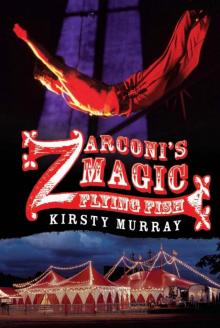 Zarconi’s Magic Flying Fish
Zarconi’s Magic Flying Fish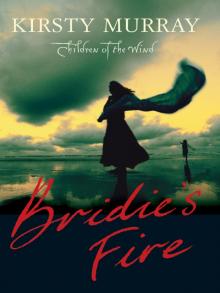 Bridie's Fire
Bridie's Fire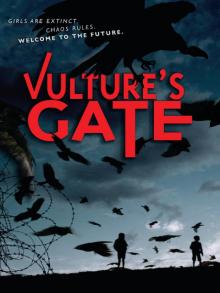 Vulture's Gate
Vulture's Gate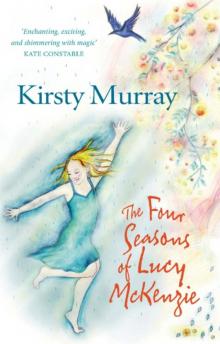 The Four Seasons of Lucy McKenzie
The Four Seasons of Lucy McKenzie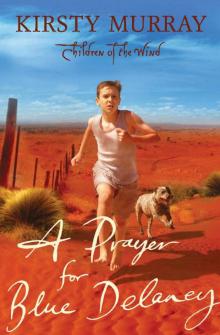 A Prayer for Blue Delaney
A Prayer for Blue Delaney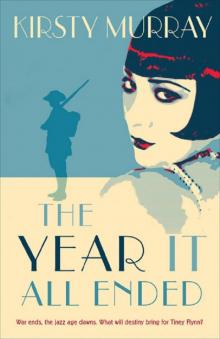 The Year It All Ended
The Year It All Ended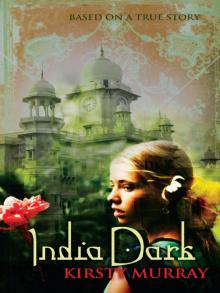 India Dark
India Dark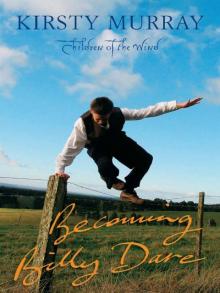 Becoming Billy Dare
Becoming Billy Dare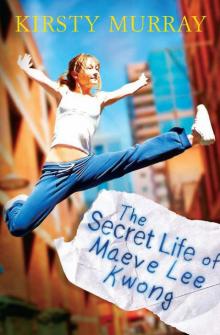 The Secret Life of Maeve Lee Kwong
The Secret Life of Maeve Lee Kwong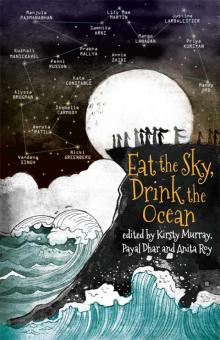 Eat the Sky, Drink the Ocean
Eat the Sky, Drink the Ocean